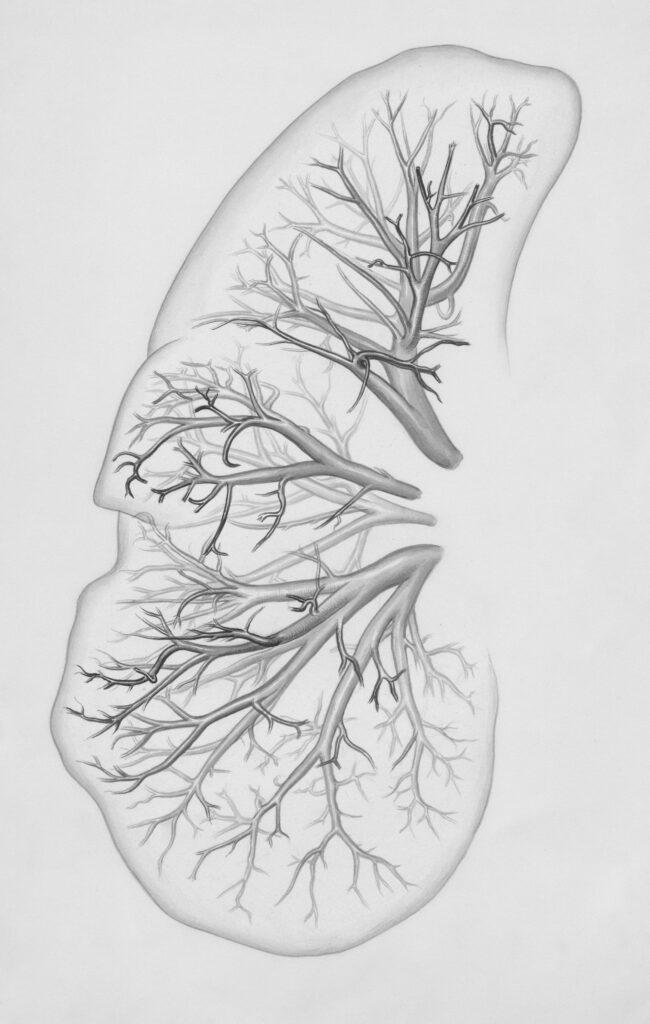Interstitial Lung Disease, otherwise known as ILD, is a grouping of rare lung conditions that currently have no known cure. With this in mind, clinical trials play a pivotal role in advancing knowledge and discovering more effective treatments.
At Simbec-Orion, we bring nearly 50 years of experience as a Clinical Research Organisation focused on oncology and rare diseases. This guide will explore how clinical trials contribute to breakthrough in ILD research and improve standards of care. It will also highlight the significance of ILD awareness initiatives in driving support for ongoing research and better patient outcomes.
What is ILD?
ILD refers to a diverse group of lung disorders that result in inflammation and scarring (fibrosis) of the lung’s interstitium, which is the tissue surrounding the air sacs. This scarring thickens the lung tissue, reducing its ability to transfer oxygen into the bloodstream.
As of recent estimates, more than 20,000 new cases of interstitial lung diseases (ILDs) are diagnosed each year in the UK. While anyone can develop ILD, risk factors may include exposure to environmental toxins, autoimmune conditions, and a history of smoking.
What are the Symptoms of ILD?
There are various symptoms associated with ILD, some of which include:
- Dry, Irritating cough
- Productive cough
- Breathlessness
- Fatigue
Types of ILD
There are over 200 different types of lung condition that may constitute an ILD. Each one can affect an individual differently, and as such they require tailored treatment methods.
Here are some of the most common types of ID:
Idiopathic Pulmonary Fibrosis (IPF)
Idiopathic Pulmonary Fibrosis is one of the most common and serious forms of ILD. Here, the scarring of lung tissue reduces the capacity of lungs to function, which causes particularly issues with breathlessness and fatigue. IPF is a progressive disease, which means its symptoms worsen over time. There is no current cause attributed to IPF.
Connective Tissue Disease-Associated ILD (CTD-ILD)
Connective Tissue Disease-Associated ILD occurs in people with autoimmune or connective tissue disorders such as rheumatoid arthritis, systemic sclerosis, or lupus. In CTD-ILD, the immune system attacks lung tissue, which causes inflammation and scarring.
Hypersensitivity Pneumonitis
Hypersensitivity Pneumonitis is caused by repeated exposure to certain environmental allergens, such as mould, animal proteins, or dust from farming. It triggers an immune response in the lungs, leading to inflammation and, over time, fibrosis.
How ILD Can Affect Everyday Life
As touched on above, the symptoms of ILDs can be debilitating and cumbersome for people who have an ILD. For some individuals, symptoms may develop gradually and remain relatively mild for a period of time. For others, the disease can progress quickly. Those in the latter category may find that this causes a direct impact on their ability to carry out everyday tasks.
The emotional and psychological toll of living with a chronic lung condition can also be challenging. Feelings of anxiety, isolation, or frustration are not uncommon, especially when activities that were once routine become physically demanding.
ILD Day 2025
Pulmonary Fibrosis Foundation’s Interstitial Lung Disease (ILD) Day returns on Wednesday, September 18, 2025. Every year, this seeks to shine a spotlight on the effects of the disease and how it can be treated.
On ILD Day, organisations, healthcare professionals, and patient communities around the world come together to raise awareness of interstitial lung diseases through education and advocacy.
How Clinical Trials Advance ILD Research
As ILD encompasses a broad range of conditions, clinical trials play a big role in understanding the disease and developing more effective treatment options.
In particular, they are essential in identifying how different therapies perform across patient groups. These trials allow researchers to evaluate the safety and effectiveness of new medications and diagnostic tools in real-world settings.
Continued investment in clinical research not only accelerates the development of treatments that can improve quality of life, but it also helps inform the best practices to employ for diagnosis and disease management.
Clinical Trials at Simbec-Orion
Simbec-Orion provides end-to-end clinical trial management across a wide range of therapeutic areas and trial phases. Our specialist-led approach allows us to seamlessly integrate with client teams and deliver support throughout the clinical development journey.
With nearly five decades of experience as a full-service CRO, we partner with global organisations to drive high-quality clinical trials. To find out more about how we can support your next study, contact us via our online form.






